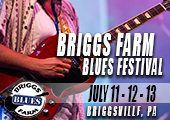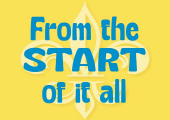 JIMMY “DUCK” HOLMES
JIMMY “DUCK” HOLMES
Cypress Grove
Easy Eye Sound – EES-011
The album format of having a veteran bluesman collaborate with rock star acolytes was established during the 1960s blues revival. Some of the best of these include: Muddy Waters with Mike Bloomfield and Paul Butterfield on Fathers and Sons (1969); John Lee Hooker with Canned Heat on Hooker ’N’ Heat (1971); and The London Howlin’ Wolf Sessions (1971) with Eric Clapton, Steve Winwood, Charlie Watts, and Bill Wyman. Cypress Grove carries on that format, pairing Bentonia, Mississippi, blues legend Jimmy “Duck” Holmes with Black Keys front man and guitarist Dan Auerbach in a tribute to Skip James, the iconic master of that Mississippi town’s distinctive style.
Holmes is not only an emotive singer and guitarist, he is also the proprietor of his home state’s longest operating juke joint, the Blue Front Café, which was founded by his parents in 1948—one year after Holmes was born. He regularly jams with a wide array of musicians who show up at the Blue Front on weekends, so he’s used to working in different contexts, and that’s evident in these performances with Auerbach and the musicians that he assembled at his Easy Eye Studios in Nashville, including drummer Sam Bacco, bassist Eric Deaton, as well as guitar slinger Marcus King on two tracks, and saxophonist Leon Michaels on one track.
The program includes three of James’ classic compositions. Holmes opens things with a stark, haunting solo rendition of Hard Times that stays true to the original. Devil Got My Woman is a standout with Holmes’ intense acoustic guitar work supported by Bacco’s percussion and Deaton’s bass. The title track adds bass and a droning texture that evokes a West African desert blues. The Tuareg sound is even more pronounced on a cover of Robert Petway’s Catfish Blues, featuring a stuttering groove and Auerbach’s fuzz-toned electric guitar. Things get almost Led Zeppelin–intense on the lumbering Little Red Rooster cover that features Michaels’ howling saxophone work. Jessie Mae Hemphill’s Train Train rides a locomotive groove that’s punctuated by Auerbach’s stinging guitar fills. All Night Long and Rock Me, the two tracks featuring King’s blistering slide work sparring with Auerbach and Holmes’ guitars, are intense and provide the veteran’s deep, resonant voice with a dramatic backdrop. Like the original 1960s blues revival veteran/acolyte pairings, the hope is that Jimmy “Duck” Holmes can expand his audience through the Black Keys association. With Cypress Grove, they’ve stayed true to Holmes’ Bentonia roots and done their part; now, it’s time for the audience to step up.
—Robert H. Cataliotti
 CRYSTAL THOMAS
CRYSTAL THOMAS
FEATURING CHUCK RAINEY AND LUCKY PETERSON
It’s the Blues Funk!
P-Vine – PLP-6960
Music has been a major factor in Crystal Thomas’ life since she was a young girl. The Shreveport, Louisiana, native played trombone in Floyd Grigsby and Johnnie Taylor’s bands, but due to family commitments and other life circumstances she has only in recent years become a full-time musician (see feature in LB #262). Since 2016 she has released two albums (2016’s Lyrical Gumbo: The Essence of Blues and 2018’s Drank of My Love), and has recorded and performed abroad with the Japanese ensemble Bloodest Saxophone. In early 2018, she cut a session in Dallas for Dialtone Records with producer Eddie Stout, bassist Chuck Rainey, and Lucky Peterson on keyboards. Selections from these sessions have just been released as It’s the Blues Funk! by the Japanese label P-Vine on vinyl.
These recordings have a burnished warmth and atmosphere that evoke Stax and Malaco in their prime. That’s due in equal measures to the production, the high quality of the P-Vine vinyl pressing, and the consummate skills of the assembled artists. Thomas is an excellent singer; her rich, assured alto voice has tone colors reminiscent of Aretha Franklin, especially on Toussaint McCall’s I’m a Fool For You Baby and Janis Joplin’s One Good Man. Her own Baby Don’t Leave Me, first released on Lyrical Gumbo, here becomes an instant Taylor-style soul blues classic. She inhabits Albert King’s Can’t You See What You’re Doing to Me with authority, and Leonard Sanders’ It’ll All Be Over with deep gospel feeling.
Lucky Peterson duets with Thomas on Let’s Go Get Stoned, and their close-cut harmonies and musical chemistry are a pleasure to hear. Thomas even displays her solid trombone chops on the percolating instrumental The Blues Funk. Fabulous Thunderbirds guitarist Johnny Moeller and drummer Jason Moeller fill out the tracks with fine texture and taste.
Dialtone has scheduled a domestic release for March 1, 2020, but don’t wait until then to pick this up—these performances were meant to be heard on wax. And don’t sleep on Crystal Thomas, either; she deserves to be heard, period.
—Melanie Young
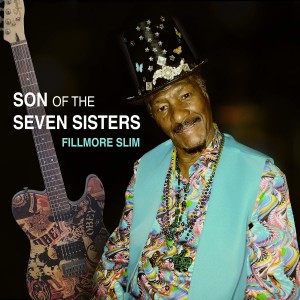 FILLMORE SLIM
FILLMORE SLIM
Son of the Seven Sisters
No label – No #
Clarence Sims, the West Coast hustler/pimp/guitarist/vocalist who performs under the name Fillmore Slim and now bills himself as the “Godfather of Hip Hop,” has been recording, off and on, since the late ’50s. He’s joined here by a rotating crew of first-rate sidemen including harpist Rick Estrin, a longtime friend whom Slim mentored when Estrin was still a teenager.
Slim’s favorite subject matter can be gleaned from some of his song titles (Legend in My Own Time, I’m a Playboy, et al.)—but he can also go in unexpected directions: Fast Gun Annie is a faux-C&W tale of a mythical border-town lady sheriff; the title song is a voodoo-drenched proclamation of prowess (supernatural and otherwise), complete with otherworldly sound effects. Elsewhere, buoyed by backing that veers from swamp funk through juke-joint boogie through hard-edged urban R&B grit, Slim serves up gritty-sweet slices of street life like I’m a Bad Brotha Foya (toughened by a rhythm-section-and-horns accompaniment that sounds like a Soul Heaven face-off between Tower of Power and the JBs) and Emma Lou, Queen of the Homeless (featuring some stinging, Elmore-style slidework from Kid Andersen). Rock Star finds Slim deep in his James Brown bag, name-checking blues, soul, and rock ’n’ roll stalwarts ranging from B.B. King and Bobby Rush through the Rolling Stones and Elvis, all the way to Judas Priest and Van Halen (!); and, of course, his playfully self-aggrandizing anthems, such as the ones mentioned earlier, both amplify and signify on his hard-won pimp/playa persona.
The octogenarian Slim may no longer be the vocalist he once was, but he still sounds pretty strong, and the music that surrounds him here, as well as his own indefatigable spirit (shamelessly macho, yet laced with just enough ironic self-awareness to avoid nastiness), are so fully realized, and so much fun, that it hardly matters anyway. Plug in and join the party.
—David Whiteis
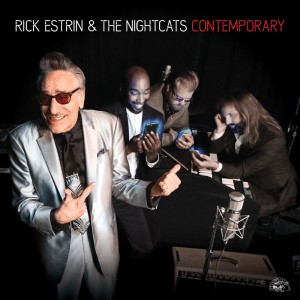 RICK ESTRIN & THE NIGHTCATS
RICK ESTRIN & THE NIGHTCATS
Contemporary
Alligator – ALCD 4996
Rick Estrin has reached an age where he’s contemplating his mortality. He faces down death in The Main Event (“The main event is over and you can bring the curtain down”) and tries to keep apace of time’s accelerating flight in this album’s opener, I’m Running, replete with cuckoo clocks and crowing roosters. But he figures he’s good for at least one more dance, looking forward to 2020 in New Year’s Eve (“It’s a brand new year and a brand new chance for me”) and eyeing a farewell tour followed by a hot comeback in the album’s hilarious title track, the video for which is well worth watching.
Estrin is a wise guy, not a bad thing when pulled off well. He does so with songs that are clever, well crafted, and framed by first-flight musicianship. Estrin’s hot harp chops are abetted by an ace core band (Kid Andersen on guitar, Lorenzo Farrell on keyboards, and Derrick D’Mar Martin on drums) and several equally fine supporting players on an album that’s a romp with a recurring reflective streak.
Groovin’ in a manner Ernie K-Doe would’ve loved, Estrin shows materialism some love in Root of All Evil (“If money is the root of all evil, whatcha call being broke?”). He offers wry relationship advice in Resentment File and lampoons the irony of playing blues in the 21st century in Contemporary. Knowing he’s in august company, he sits out the instrumental House of Grease, a funky blues showcase for guitarist Kid Andersen that recalls the late Freddie King. Everyone gets to blow on Cupcakin’, featuring a terrific organ solo by composer Lorenzo Farrell. The album’s final instrumental, Bo Dee’s Bounce, offers an exuberant groove and Estrin blowing up a storm much in the spirit of Little Walter.
Without being slavishly imitative of past greats, Estrin and his Nightcats are, at heart, a straight-ahead trad blues band. Yet they avoid sounding self-consciously retro, as their tight musicianship and tough delivery make their music come over sounding fresh: the fact that all but one of the dozen tracks here are originals helps, and on the one cover (Bobo Jenkins’ 1955 burner Nothing But Love) the lyrics are slightly tweaked. Estrin’s blues vocabulary is deep enough for him to match an old master’s style with his own new songs: She Nuts Up is eccentric in a way that recalls Sonny Boy Williamson II, so Estrin’s harp solo echoes Rice Miller’s style.
So what’s not to like? Some listeners may take umbrage at Estrin’s reflections on women, be they concerned with curves (New Shape), craziness (She Nuts Up), or never-forgotten slights (Resentment File). But wise guys rarely please everyone, and Estrin’s sense of humor should defuse most objections. Purely from the standpoint of musicianship, this is an album (the group’s fifth for Alligator, produced by Estrin and Kid Andersen) that showcases a terrific blues band with a real character for a front man. Miss it at your peril.
—Mark Humphrey
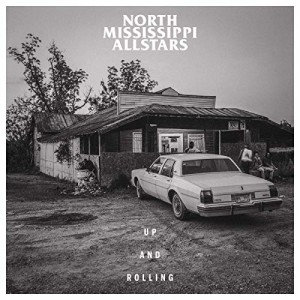 NORTH MISSISSIPPI ALLSTARS
NORTH MISSISSIPPI ALLSTARS
Up and Rolling
New West Records – NW6466
It’s hard to believe that the North Mississippi Allstars released their first album 23 years ago. Up and Rolling is their ninth studio album (along with numerous live recordings), and it is made up of the same basic building blocks that were so captivating when they burst upon the scene. The impressive thing about this new recording is that they are able to continue to draw from a distinctive roots music well and keep things authentic and exciting.
The Dickinson brothers, Luther on guitar and vocals and Cody on drums, keyboards, and vocals, have been the core of a band that has been at various times a duo, a trio, and a quartet. The 2019 edition is a quintet that brings vocalist and cane fife player Shardé Thomas, bassist Carl Dufrene, and vocalist Sharisse Norman into the fold. It’s always been a community affair, and guests this time around include vocalist Mavis Staples, vocalist/guitarist Jason Isbell, guitarist Duane Betts, vocalist/guitarist Cedric Burnside, bassist Garry Burnside, pedal steel guitarist Roosevelt Collier, organist Rev. Charles Hodges, vocalists Tierinii Jackson and Tikyra Jackson, and a cameo from the late vocalist Otha Turner. They are definitely living up to the Allstars moniker.
In many ways, Up and Rolling circles back to the days before they formed the band, when the Dickinsons were young men on the North Mississippi Hill Country scene. In his liner notes essay, Luther says he was drawn back to those days when he came across photos taken by Texan Wyatt McSpadden of the music scene in 1996. They took the visitor on a whirlwind tour of an embarrassment of local blues and roots music treasures, introducing him to the elder statemen who were mentors to the young musicians: their father, producer/keyboardist Jim Dickinson; fife and drum band legend Otha Turner; and blues guitar/singer giants R.L. Burnside and Junior Kimbrough. Those Hill Country pioneers are gone, but the next generations of those families carry on the traditions, and they do it with respect, talent, and fire—and that’s what makes Up and Rolling so compelling. The opening track, Call That Gone, is flat out devastating in its intensity as Luther and Shardé engage in a call and response on vocals and slide guitar and fife. This one track alone is worth the price of admission. But, there’s plenty more to come. Highlights include Staples’ trademark gospel power on a remake of her family’s What You Gonna Do?; the rocking version of Little Walter’s Mean Old World with Isbell and Betts that features a dynamic Allman Brothers slide guitar jam coda between Luther and Betts; the tripped-out, funky vocal duet with Luther and Norman that rides on Cody’s Wurlitzer keyboard–generated groove on the title track; and Luther and Cedric Burnside’s simpatico vocals on the latter’s father’s Out on the Road and the Thomas A. Dorsey classic Precious Lord.
One of the lessons that Dickinson recalls from those early days when McSpadden first visited the Hill Country was Turner and Kimbrough’s attitude that “everyone is welcome.” The present-day musical community contributing to this album is evidence that they have taken this to heart, particularly in the lyrics that exhibit a social consciousness and espouse racial unity. The North Mississippi Allstars are definitely Up and Rolling, and here’s hoping there’s another generation ready to carry this on.
—Robert H. Cataliotti
 BREEZY RODIO
BREEZY RODIO
If It Ain’t Broke Don’t Fix It
Delmark – DE860
A mainstay of the Chicago blues scene, Breezy Rodio has made tremendous strides as a solo artist after serving his apprenticeship with others. Now, with If It Ain’t Broke Don’t Fix It, he notches up another accomplishment, furthering the momentum he gained with his previous effort, the aptly titled Sometimes the Blues Got Me, as well as the two impressive albums that preceded it.
Indeed, Rodio’s confidence and competence is demonstrated throughout. The combination of his assertive vocals, stinging guitar, and a robust horn section add extra verve and vitality to this generous 16-song set. That’s evident even at the outset with the title track that serves as the album opener. It finds Rodio urging his would-be lover to appreciate what’s before her as opposed to what might be waiting over the horizon. His fluid fretwork adds a distinctive sting that allows the song to reach a rollicking conclusion.
Its follow up, From Downtown Chicago to Biloxi Bay, continues along the same tack, with Rodio again trying to convince his baby not to leave him behind. Here too, his searing lead lines add emphasis to his furtive plea. This time however, the dazzling harp work that comes courtesy of Simone “Harp” Nobile plays the same role as the brass did before, bringing the song equal aplomb.
As the rest of the set progresses, from the sturdy slow blues of A Woman Don’t Care and Los Christianos to the rollicking rhythms of I’m a Shufflin’ Fool and Desperate Lover, Rodio demonstrates a decided authority that he asserts throughout. The melodies are crisp and well defined, the arrangements rich and resilient. Rodio proves that he’s a master of his craft, not only as a producer, arranger, and instrumentalist, but also as an adept songwriter who claims credit for all 16 songs in the set. Indeed, while 16 songs might have strained the limits of another artist, Rodio maintains consistent quality throughout. Even a jazzier number like Look Me in the Eye sounds like a familiar standard from the get-go, as does the gospel-like revelry of the autobiographical Led to a Better Life.
Ultimately, Breezy Rodio is clearly on course to reach greater heights and hopefully gain some much-deserved notice along the way. As If It Ain’t Broke Don’t Fix It attests, Rodio’s hit his stride and there’s no reason to shift his stance anytime soon.
—Lee Zimmerman
 JOE LOUIS WALKER
JOE LOUIS WALKER
Viva Las Vegas Live
Cleopatra Records – CLO 1308
San Francisco–born Blues Hall of Famer Joe Louis Walker joined the musician’s union at age 14. Living in the Bay Area exposed him to a wide variety of music styles, which contributed to his unrestricted amalgam of guitar playing that effortlessly blends soul, funk, rock, R&B, gospel, and of course, the blues. More than 25 albums and over 50 years later, Walker brings his sparkling Zemaitis guitar to video with Viva Las Vegas Live, a stellar performance captured at Boulder Station Casino in Las Vegas. Backed by the capable trio of keyboardist Bruce Bears, drummer Dorian Randolph, and bassist Lenny Bradford, Walker lets fans ride along with ten tunes on this impressive DVD recorded inside the Railhead Club, along with a complementary full-length CD for extra measure.
On the up-tempo blues opener, I’m Not Messin’ Around (from Verve’s 1999 release, Preacher and the President), Walker croons like a cross between Jimmy Rogers and Robert Cray, and offers a high-powered solo that really cooks. Young Girls Blues (from 2015’s Grammy-nominated Everybody Wants a Piece) is a beautiful Chicago shuffle with the patented lumpty-lump in the traditional key of E. The outstanding keyboardist Bruce Bears takes an extensive solo with unbridled polyrhythmic propulsion.
Sugar Mama slows it down and really shows Walker’s finesse with the buttery-soft touch that belies his flashy licks—he creates a wide array of special effects using nifty right-hand picking techniques. He’s got chops to spare, which never fails to please the crowd. Even more impressive is when he breaks out the harmonica and wails in the upper register à la Jimmy Reed, taking a casual stroll through the audience and shaking hands with individuals while singing and blowing harp.
Do You Love Me? (from 2004’s New Direction) is a tour de force where Walker clamps a capo on the fifth fret and breaks into a Hooker-driven rhythm solo, shifts to a funk-rock groove, then to a killer overdrive-laden blues-rock solo. He does some serious testifying when he delivers two spiritual tunes—In the Morning and the New Orleans–tinged Soldier for Jesus (recorded on New Direction and also 2012’s Hellfire).
You Don’t Love Me Girl (also from New Direction) is a minor blues that features a greasy, lengthy Hammond B3 organ solo feature from Bears—Joe Louis and the boys really take their time to slowly build the tension underneath him over several choruses. Black & Blue (from Everybody Wants a Piece) is a galloping, Memphis-style groove, and Walker delivers a Santana-tinged guitar sermon that pops, sputters, then wails with sustain and grit. By far, it’s the hottest solo of the entire affair.
The boogie tune Too Drunk to Drive Drunk (from Hellfire) had both Walker and bassist Lenny Bradford doing Chuck Berry duck walks (forward and backwards!). The final encore—early Fleetwood Mac’s version of Like It This Way—is a touching tribute to Mac’s legendary guitarist Peter Green.
It’s no overstatement to say that this music is even better seen than heard (the DVD bonus interview film footage is excellent by the way). To hear Walker scream that howling falsetto note with his voice is one thing—to watch him hit it is waaay cooler.
—Wayne Goins
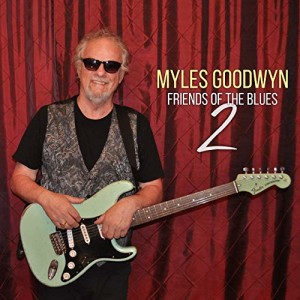 MYLES GOODWYN
MYLES GOODWYN
Friends of the Blues 2
Linus Entertainment – 270421
Myles Goodwyn—songwriter, frontman, and guitarist for April Wine—had so much fun making Friends of the Blues, he gathered another large group of friends to join him on this new album. Goodwyn shows off his songwriting chops in the 13 original tunes he’s written for the album, which also contains his and his friends’ take on Bobby Womack’s It’s All Over Now. The friends who join Goodwyn for this party include guitarist Matt Andersen, keyboardist Ross Billard, harpist Mike “Shrimp Daddy” Reid, pianist Kenny “Blues Boss” Wayne, and vocalist Angel Forrest, among others.
The album opener, Hip Hip, blends talking blues and jump blues New Orleans style, with Kenny “Blues Boss” Wayne’s sauntering stride piano playing call and response with Goodwyn’s noodling leads. Goodwyn and Crew slow down Womack’s It’s All Over Now to a smoldering jazz blues featuring Billard on organ, John Main on piano, and “Shrimp Daddy” getting down with smoldering harp runs. Dewey Reeds’ high and lonesome harmonica sound weaves in and around Matt Andersen’s moving guitar fills and Goodwyn’s melancholy vocals on You’ve Got It Bad. Speedo (Revisited) opens with a street corner doo-wop introduction before rocketing off into a 1950s-style novelty rock tune, fueled by Jeff Mosher’s sax and Jack Semple’s guitar and floating along the background vocals of Reeny Smith and Lisa MacDougall. Angel Forrest sensually delivers the can’t-live-with-you-can’t-live-without-you heart of the torch song Being Good (Won’t Do Us Any Good Tonight). The album’s closing track, I Saw Someone That Wasn’t There (and It Was You), is a soulful rocker with phrases of Chuck Berry–style guitar floating along juke joint piano rolls. David Gogo’s stinging lead runs romp and swagger through the tune, propelling this straight-ahead rocker.
Goodwyn and his friends traverse a wide expanse of the blues on this album, moving effortlessly from jump blues to blues shuffles to jazz blues to down-to-the-bone rock. Goodwyn’s songwriting provides the foundation for the musical diversity on this album, and he leads the way with his guitar playing and singing. He can still put together a band that brings out the very best in the music so that it moves us body and soul.
—Henry L. Carrigan Jr.
 BETH HART
BETH HART
War in My Mind
Provogue – PRD – 75952
The poignant and powerful beauty of Beth Hart’s music lies in her canny ability to deliver straight-to-the-heart, down-to-the-marrow lyrics clothed in soulful music that tears us up and heals all at the same time. The title track of her new album, for example, opens sparely with Hart’s subtle piano chords repeating the musical phrase that runs throughout the entire song. After four bars, a guitar downstrum signals a new movement and the song blossoms operatically as Hart’s vocals soar into the spacious sounds she and her band have created. There are moments in this sonic landscape that mirror and evoke the beautifully broken character of the singer and the lyrics: “War in my mind / There’s a war in my mind / Seek and ye shall find / That it’s hollering all the time / There’s a war in my mind.” War in My Mind signals the vulnerability and the openness that Hart brings to us in each song. Even though she’s opening her soul, sharing her battles and struggles, she offers us a gift tied up with soaring choruses and verses that carry us into the deepest corners of her heart and into the beauties of a universe of which we’re a tiny part.
The gospel-inflected Let It Grow may be the highlight of the album. The song opens with angelic voices that prepare our hearts for the beauty that follows. Hart’s almost whispered vocals follow these voices, affirming her smallness: “I am small I know / A diamond in the coal / Just a penny in the stream / Working on a dream.” A choir floats under Hart’s vocals by the second verse, elevating the singer to the heights of hope; no matter how small she feels, she can embrace the promise that if she waters the seed of hope within her, it will grow. There’s a beautiful defiance here, as well as palpable determination. The minor chord shuffling blues rocker Sugar Shack delivers a cinematic portrait of desire and loss and the craving for the sustenance that a lover can bring the singer.
Every single song on War in My Mind illustrates Hart’s way with a lyric and her ability to fashion music that mirrors the meaning of her words. As a writer, she has an uncanny resemblance to Laura Nyro and Nyro’s way of digging deep into herself for her lyrics while at the same time never shying away from the ragged landscapes of life around her. War in My Mind offers musical wealth beyond measure and repays richly on every listen.
—Henry L. Carrigan Jr.
 BOB MARGOLIN
BOB MARGOLIN
This Guitar and Tonight
VizzTone – VT-SRR004
Back before he even acquired the nickname “Steady Rollin’” Bob Margolin, the Massachusetts-bred guitar slinger had proven his blues bonafides as a member of Muddy Waters’ band from 1973 to 1980. While it may have been a shock for many seeing a young, white guitarist on the bandstand alongside the veteran African American players in Muddy’s band, Margolin’s undeniable skill and deep reservoir of unadulterated blues feel erased any doubt that he belonged. He would carry that lofty reputation and respect with him over the course of a long solo career.
Surprisingly, This Guitar and Tonight is Margolin’s first all-acoustic album. He attacks the nine original tracks with just his trusty 1930s-era Gibson parlor guitar to create a stripped-down, front porch vibe. The album is augmented with guitar by Jimmy Vivino and Bob Corritore’s harp on a couple of tunes, but otherwise it’s all Margolin on an old-school effort with minimal processing or mastering, or as Steady Rollin’ describes it, “no sugar added.”
While the CD is devoid of Margolin’s sharp-tinged electric playing, he dazzles on the acoustic and the vocals feature his customary mix of introspection, political/social commentary, humor, and tried-and-true blues ethos.
Opening with the excellent title track, Margolin takes you on a journey through the acoustic blues countryside bolstered by his balladeer-in-bluesman’s-clothing vocal delivery and inventive arrangements.
Evil Walks in Our World is a no-holds-barred takedown that leaves no ambiguity about Margolin’s opinion of the current occupant of the White House. “Fake news / fake politicians / racism / families in cages,” Margolin pleads over a deliberate, plodding groove.
He turns inward on the slow burn Over Time; a conversation between his older and younger selves, before lightening the mood with the up-tempo romp of Dancer’s Boogie, where he channels his inner Roy Brown: “Don’t worry ’bout nothin’ / get on the floor and dance / dance with your partner / don’t look at your phone.”
Corritore adds some crisp harp to the slow shuffle of Blues Lover, and Good Driving Song is an excellent mid-tempo instrumental. The talk-sing approach is perfect for the contemplative I Can’t Take Those Blues Away, which touches on being thankful for your blessings and the loss of music education in schools.
Margolin plunges the depth of his decades of playing the blues on the eight-minute closer, Predator, a claws-out rebuke of the current commander in chief.
Margolin wears his heart and his view of society’s ills on his sleeve on This Guitar and Tonight. It may come off as preachy to some, but thanks to his unique ability to deliver the goods, it mostly plays as acoustic blues comfort food.
—Rod Evans










